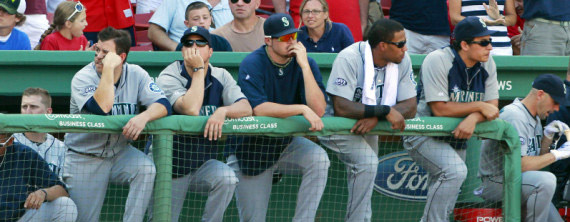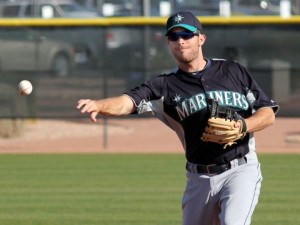
Prior to yesterday’s 9-2 rout of the New York Yankees, my beloved Seattle Mariners made headlines for all the wrong reasons as they dropped a club record 17 straight games.
Just a few weeks ago, the M’s record sat at 43-43, only 2.5 games back of 1st place in the AL West. Seventeen straight losses (and 1 win!) later, the season is essentially over. The question seemingly on everyone’s minds is, “How did it all go so wrong, so fast?” The problem though, is that the question exhibits a general lack of understanding regarding the state of the team. (Grab your forks and knives, folks. Pancho is about to dish out a healthy serving of perspective.)
Last season, the Mariners had a historically poor offense, batting .236 for the season and scoring a paltry 513 runs, both numbers by far the worst in the majors. That team lost 101 games. This season has actually been statistically worse than that: A team batting average of .224, and 336 runs scored through July 27, 2011. Again, both categories rank dead last in the majors by a considerable margin.
Coming off the 101-loss season, the M’s were picked to again finish in the basement of the AL West by most experts. So, why is it suddenly a surprise to everyone that the Mariners are where they are in the standings? On July 27, 2010, Seattle was 39-62. A year later, with a worse offense, this team is 44-60. The record is exactly where it should be.
I’m a believer that the 162-game regular season does the best job of crowning division champions in any sport. Because there are so many games, the law of averages tends to even things out to where they should be statistically. The statistics should then, in turn, translate directly to the standings. The fact that this team was .500 only a few weeks ago was a statistical anomaly. The losing streak was the statistical Mother Nature’s way settings things straight again. The losses should’ve been there all along. It’s just really unfortunate (and newsworthy) when they all happen in a row like that. Really, the only difference from a year ago is that we already knew last season was over in May. I appreciate that this team was able to stay in the race into the summer months this year. Was it blind ambition? Foolish hope? Perhaps. But when the only direction to go is up, any and every small positive thing can be built upon.

You're Our Only Hope, Dustin Ackley
As for me, I’ve taken much from this season and learned a lot about the state of the franchise going forward. I’ll take Felix Hernandez and Michael Pineda against any 1-2 pitching duo in baseball for the next five years. Dustin Ackley has lived up to the hype of being the #2 overall draft pick two years ago, and he’s now the object of my current mancrush. I’m also a big fan of slugger Carlos Peguero, who was recently sent back down to AAA. He has no plate discipline, but he sure can mash the living hell out of the ball. Once he figures it out, you can pencil him in for 30+ home runs a season. There are also other prospects (Beavan, Carp, Seager, just to name a few) who look the part of being positive contributors in the future.
On the negative side, the M’s should bench, trade, or release the overpaid veteran bats who can’t hit. It makes no sense to pay $9 million a year for a third baseman with no power to hit .180. It also makes no sense to keep starting an outfielder who is hitting .190. Don’t care if he’s supposedly the best defensive centerfielder in the game. There’s a perfect role for him based on his production: Late-inning defensive replacement.
These are very trying times for this lifelong Mariners fan. It’s never fun when your team is in the dumps. There are two months left in the season, and I really hope that the M’s use this time to call up more prospects and give them all a shot. At this point of another lost season, the thing that keeps me coming back is the hope of a promising future, patiently waiting to be realized. More foolish hope? Perhaps. But there’s only one way to find out: Play ball. Go M’s!


 Almost as bad (and much more idiotic) as the bandwagon hopper is the polygamist who claims to have two or more favorite teams within the same sport. The worst is when the two teams fall within the same division of the particular sport. I went to high school with a guy who claimed that his two “favorite” NBA teams were the Celtics and the Knicks. Liking these two teams equally is an impossibility, as they compete for the same division every year. The inherent flaw of this guy’s logic exposes itself when the two teams face off against each other: He then roots for the Celtics. If that’s the case, then you can’t claim for the Knicks to be your favorite, Bruno. Look up the definition of “favorite” some time. You’ll see what I mean.
Almost as bad (and much more idiotic) as the bandwagon hopper is the polygamist who claims to have two or more favorite teams within the same sport. The worst is when the two teams fall within the same division of the particular sport. I went to high school with a guy who claimed that his two “favorite” NBA teams were the Celtics and the Knicks. Liking these two teams equally is an impossibility, as they compete for the same division every year. The inherent flaw of this guy’s logic exposes itself when the two teams face off against each other: He then roots for the Celtics. If that’s the case, then you can’t claim for the Knicks to be your favorite, Bruno. Look up the definition of “favorite” some time. You’ll see what I mean.